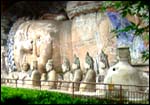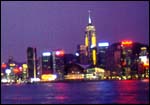


|
|
 |
| HOME | TRAVEL | TRAVELOG | ||

On a Bus to China ... ... how to backpack behind the Bamboo Curtain Text and photographs: Nilesh Korgaonkar Sichuan is famous for its delectable cuisine. But the food is so different from what we eat in India, that one had to make the effort to be adventurous and taste what is on offer. There is a wide variety of fare available, at varying prices, depending upon where you eat. The reasonably clean pavement stalls along the river are the cheapest. The draft beer is both good and cheap. Chengdu, the capital, resembles any of the glitzy cities of Europe. The Sichuan Opera is a must see, especially if you are into music and want to savour the Chinese variety. The Panda breeding research station, just outside the city, is really intriguing. It feels great to see these animals in person. And to the literature available, they are doomed to extinction because of their lifestyle. The mighty Yangtze river begins its journey to the east from this province and one can not leave this province without taking a boat ride or two on the river.
The Stone Forests of Shilin are a unique natural phenomena. The architecture of the pagodas and the other old buildings of the provincial capital in Kunming are largely untouched by the boom that has hit the other Chinese cities. It is also a gateway to the other southeast Asian countries of Myanmar, Laos, Cambodia and then onto Vietnam or Thailand. The terracotta warriors of Xian, the Great Wall in the Heibei province and the ancient city of Beijing are other sites that need no recounting. The economic boom that is now synonymous with China is visible in almost all large towns, but it is most prominent in the southern provinces.
Trains in ChinaI believe that the zealous traveller always moves with his heart and mind as close to the ground as possible. It is the only way to really take in the various flavours and tastes that a new country has to offer. Flying is best left to the business traveller.
As it exists today, the train is probably the best means of travel in China. It is cheap, fast, clean and efficient. There is no ticketless travel and reservations are available whenever you want it. There are many classes of coaches from ‘hard seats’ to ‘soft sleepers’. I would recommend the hard seat for short journeys. On longer journeys, you are better off paying the slightly higher fare for a ‘hard sleeper’ berth. The dining cars, so fondly missed on Indian trains, are a common sight on Chinese trains and a welcome place to have a quiet meal while the train meanders through scenic countryside. The only problem with travelling by train in China is to make yourself understood whilst purchasing a ticket. After a rather long wait in a queue at Golmud for a ticket to Lanzhou the first time around, I realised the benefit of using the services of touts. Stand outside the reservation hall and one of them will find you. The reservation system does not require your name and this makes it quite safe to purchase your ticket from these Samaritans! Just make sure that you have been given the correct ticket by comparing the Chinese characters depicting the destination to the ones in your travel book wherein the names of various places should be given both in English and Chinese. The time, date and train number can be easily read.
Then, about 15 minutes before the train departs, there is another queue for entry on to the platform where the train is standing. Make sure, by constant checking with other passengers, that you are in the right queue at all times as there is no time to rectify mistakes. But all these strict rules ensure clean platforms, trains and a comfortable and smooth travel. If you are constrained by time or money, China does have several airlines that are now hooked to a national reservation network. Reservation, cancellation and changes are possible from quite a few places now. Buses ply extensively all over China and, because of the vast distances involved, most of them are double-decker, semi-sleeper coaches. The road network is also one of the most modern and the spanking new highways that are coming up have made road travel faster, smoother and cheaper. What to eatChinese cuisine is vastly different from what we Indians are used to eating in Chinese restaurants in India. And it is justifiably famous -- a fine art perfected through the centuries. The quality, availability of ingredients and cooking styles vary drastically from region, but you will almost always find something to suit your tastes.And yes, despite the fact that the Chinese are notorious for eating anything on four legs except the table, it is possible to ask for and be served strictly vegetarian food. Just learn how to say, "I am a vegetarian" or "Wo chi su!" when ordering food. I always did so whenever I thought I might be served something I do not like and enjoyed the delicious mushrooms, bamboo shoots, sprouts, eggplant and a variety of other vegetarian stuff served with noodles or rice.
You can adopt the same method when you decide to sample food from any of the numerous informal, Parisian style pavement stalls. Unless you dine in the restaurants within the fancy hotel, prices are generally low. But it is always better to be sure of what you are going to pay before you order your dish. A few exotic dishes are ridiculously expensive -- even if they taste lousy -- and you can’t count on the staff to warn you in advance. My favourite dishes were chicken gang bao or diced chicken served with peanuts and soya sauce. And pork fried with rice crispies or pork and vegetables in a thick sauce poured over chunks of crisp rice with a great sizzling noise and the various types of kebabs that were served by the Muslims in the northwest. Firmly believing that you haven’t really understand a country until you have tasted their most unique dishes, I did not hesitate to taste Five Step Snake, sautéed snails, shredded eel and other stomach-turning ‘exotica’. Snake was a real rip-off at 100 yuan, as I couldn’t tell the difference between it and the capsicum it was served with.
ChopsticksYou’ll have to master the art of using chopsticks because there is seldom anything else available besides your hands! Disposable wooden chopsticks are universally available. Don’t worry about making a mess. Every one does! Raise the bowl up to your lips and shovel in the rice if you want to. Spitting bones on the tablecloth or floor is standard practice.The same chopsticks that you eat with are used for helping yourself to servings from the main course that are dumped in larger bowls on a revolving lazy susan in the centre of the table. The best way to master chopsticks: to be as hungry as a horse in a place where there are no knives and forks! Tip: Look around and try to ape the locals. The moment the locals catch onto the fact that you are a foreigner who speaks good English, one often gets invited to impromptu meals. Youngsters will not hesitate to stop you on the road and ask you if they can ‘practise’ their English speaking skills. Then they will wonder if you could spare the time to have meal with them! It happened quite a few times to me in various cities and left me with a sense of having ‘done my good deed for the day’, not to talk of the free meal thrown in. A word of advice though… it is best to be very specific about what you would like to eat. Otherwise, in their enthusiasm, your host might order something he thinks is exotic and you will be hard put to refuse.
A Final Word I spent a month in China. As a travel and holiday destination,
it is, to put it mildly, a strange choice. A tourist travelling in this country is unable to get a real feel of the place. The authorities restrict timings and allow movement in only certain areas.
I spent a month in China. As a travel and holiday destination,
it is, to put it mildly, a strange choice. A tourist travelling in this country is unable to get a real feel of the place. The authorities restrict timings and allow movement in only certain areas.
The conditions for travel may not be the best -- but they are improving. China is now making a determined effort to catch up with the Wes . And she is not far away from her goal; therefore, it is imperative to see the country before the liberalisation policies changes her face forever. The downside of my month-long journey through this fascinating country and seeing the efficiency of many of its systems was that I came away with the distinct impression that our politicians have been taking us for a ride for the last 50 years. Next fortnight Rediff Travel brings you Nilesh Korgaonkar’s travelog on the places he visited in China. Watch this space!
|
|
|
Back
|
|
|
|
|
|
HOME |
NEWS |
BUSINESS |
CRICKET |
MOVIES |
CHAT
INFOTECH | TRAVEL | LIFE/STYLE | FREEDOM | FEEDBACK |
|